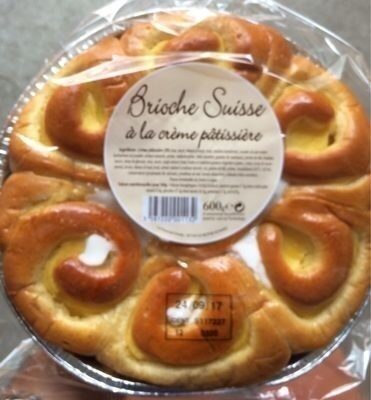
Barcode: 3587220001132
Brioche Suisse
HARAM
📝 Reason: This product’s formulation includes materials that are categorically Haram according to all major Islamic schools of thought and scholarly consensus.
🏷️ Category: Snacks, Sweet Snacks, Sweet Pastries And Pies, Viennoiseries, Brioches, Fr:Brioches A La Creme Patissiere
📄 Certificates: Green Dot
Ingredients:
Details
Understanding the Halal Status of Brioche Suisse
Brioche Suisse is a sweet pastry that has gained popularity for its delicious taste and fluffy texture. However, many consumers are concerned about the Halal status of such products, especially in diverse communities where dietary restrictions play a crucial role in food choices. Unfortunately, when it comes to Brioche Suisse, the consensus among major Islamic scholars is that this product is categorized as Haram.
Why is Brioche Suisse Considered Haram?
The primary reason that Brioche Suisse is deemed Haram lies in its formulation, which incorporates ingredients that are not permissible in Islam. For instance, one of the notable components listed is natural flavor (contains alcohol), which directly conflicts with Halal dietary requirements as alcohol is strictly forbidden in Islam. Therefore, this leads to the conclusion that the product cannot be considered Halal.
Breaking Down the Ingredients
Let’s delve into the specific ingredients present in Brioche Suisse to understand their status according to Islamic guidelines:
1. Pastry Cream (35% Components)
This includes water, sugar, fresh egg whites, modified starch, whole milk powder, and whey powder, which are all considered permissible in Islam. However, further processing and contamination risks can arise depending on how these ingredients are sourced.
2. Sugar
Sugar is deemed permissible according to Islamic law, and its usage in the pastry is acceptable.
3. Fresh Egg Whites
These are also permissible as they derive from a halal source.
4. Modified Starch
Classified as permissible, but always worth checking for cross-contamination with non-Halal products.
5. Whole Milk Powder and Whey Powder
Both are considered permissible, provided they come from halal-certified dairy farms.
6. Natural Flavors and Additives
While most natural flavors can be Halal, in our case, one contains alcohol, flagging it as Haram.
7. Fondant, Glucose Syrup, and Sweeteners
All these sugar-based ingredients are deemed permissible. However, like all ingredients, the processing method is key.
8. Vegetable Oils (Palm and Rapeseed)
Generally permissible, provided there are no cross-contamination issues.
9. Inverted Sugar Syrup and Yeast
Both are allowed under Islamic guidelines.
10. Natural Flavor (contains alcohol)
This component invalidates the Halal status of the product, as consuming alcohol is prohibited in Islam.
11. Emulsifiers E471 and E472e
E471 is typically derived from either animal or vegetable fat and is permitted if sourced from Halal sources. E472e, used as an emulsifier, is generally seen as Haram if sourced from non-permissible origins.
12. Preservative (Calcium Propionate)
This is permissible as long as it meets Halal standards.
13. Other Ingredients
Ingredients such as milk proteins, inactive yeast, salt, and coloring (beta carotene) are deemed permissible assuming no additional Haram elements are included during processing.
Conclusion
To summarize, while several ingredients in Brioche Suisse could be permissible under Halal guidelines, the presence of natural flavors containing alcohol and the likelihood of cross-development with non-Halal sources ultimately classify Brioche Suisse as Haram. As consumers, it is essential to check each product thoroughly and investigate sourcing to ensure compliance with Halal requirements. Understanding these nuances helps promote informed choices, especially for those looking to adhere to dietary restrictions due to faith. Always refer to Halal certification processes to ensure trust in products. The Green Dot certification does exist, but it is crucial to inquire further regarding specific sourcing and processing details.
